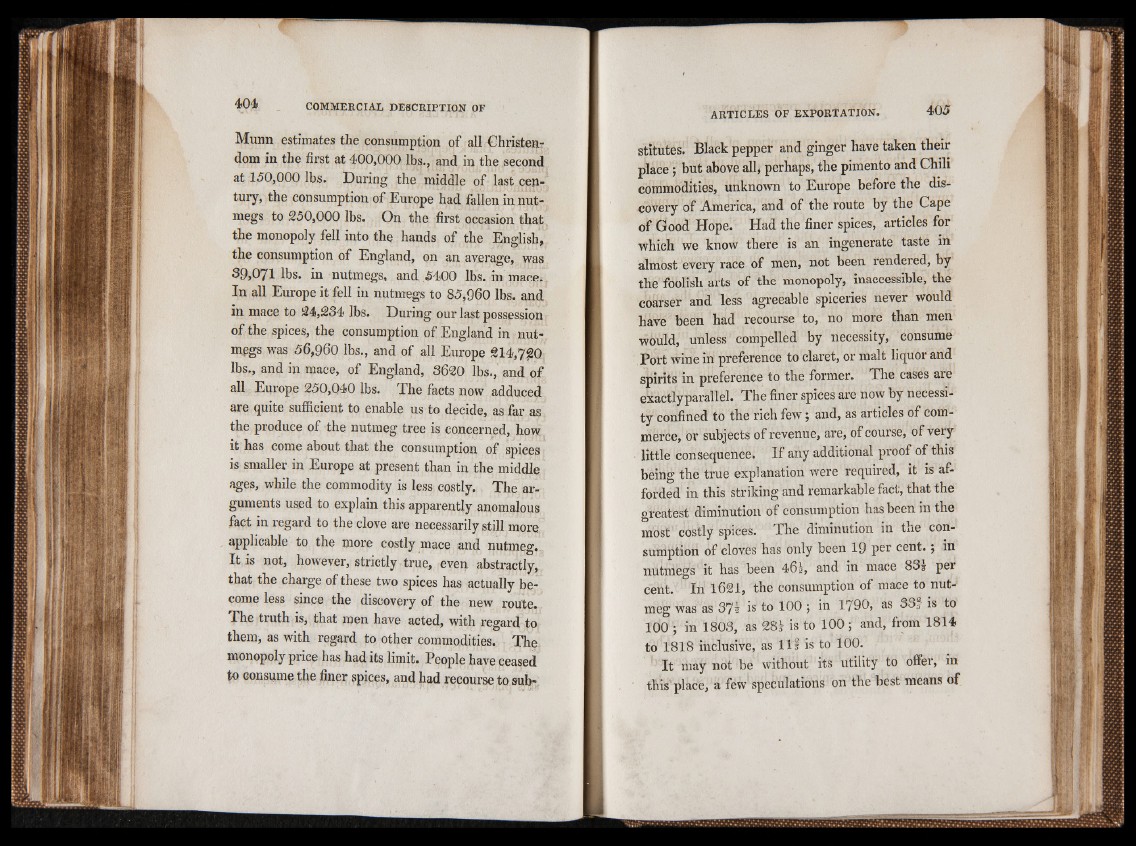
Munn estimates the consumption of all Christendom
in the first at 400,000 lbs., and in the second
at 150,000 lbs. During the middle of last cen-1
tury, the consumption of Europe had fallen in nutmegs
to 250,000 lbs. On the first occasion that
the monopoly fell into the hands of the English,
the consumption of England, on an average, was
39,071 lbs. in nutmegs, and 5400 lbs. in mace*
In all Europe it fell in nutmegs to 85,960 lbs. and
in mace to 24,234 lbs. During our last possession
of the spices, the consumption of England in nutmegs
was 56,960 lbs., and of all Europe 214,720
lbs., and in mace, of England, 3620 lbs., and of
all Europe 250,040 lbs. The facts now adduced
are quite sufficient to enable us to decide, as far as
the produce of the nutmeg tree is concerned, how
it has come about that the consumption of spices
is smaller in Europe at present than in the middle
ages, while the commodity is less costly. The arguments
used to explain this apparently anomalous
fact in regard to the clove are necessarily still more
applicable to the more costly mace and nutmeg..
It is not, however, strictly true, even abstractly,
that the charge of these two spices has actually become
less since the discovery of the new route.
The truth is, that men have acted, with regard to
them, as with regard to other commodities. The
monopoly price has had its limit. People have ceased
fo consume the finer spices, and had recourse to substitutes.
Black pepper and ginger have taken their
place; but above all, perhaps, the pimento and Chili
commodities, unknown to Europe before the discovery
of America, and of the route by the Cape
of Good Hope. Had the finer spices, articles for
which we know there is an ingenerate taste in
almost every race of men, not been rendered, by
the foolish arts of the monopoly, inaccessible, the
coarser and less agreeable spiceries never would
have been had recourse to, no more than men
would, unless compelled by necessity, consume
Port wine in preference to claret, or malt liquor and
spirits in preference to the former. The cases are
exactlyparallel. The finer spices are now by necessity
confined to the rich few; and, as articles of commerce,
or subjects of revenue, are, of course, of very
little consequence. If any additional proof of this
being the true explanation were required, it is afforded
in this striking and remarkable fact, that the
greatest diminution of consumption has been m the
most costly spices. The diminution in the consumption
of cloves has only been 19 per cent.; in
nutmegs it has been 462, and in mace 83? per
cent. In 1621, the consumption of mace to nutmeg
was as 37^ is to 100 j in 1790, as S3?- is to
100 ; in 1803, as 28|is to 100; and, from 1814
to 1818 inclusive, as 111 is to 100.
It may not be without its utility to offei, in
this place, a few speculations on the best means of